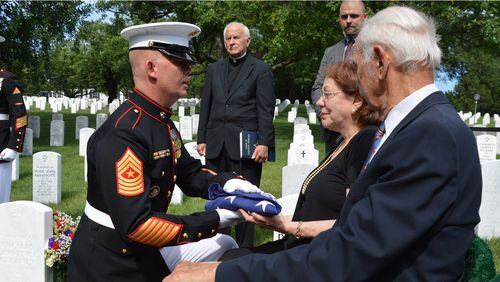Of the dozens of civilians and uniformed military members gathered at Arlington National Cemetery to memorialize Marine Sgt. John Baczewski the other day, only one had ever met him — my mother. She received the American flag that six Marines held over the place where her brother’s grave would be, if there had been a body to be buried. There wasn’t. My uncle was killed in action in Korea, 63 years ago. His remains were never recovered.
It was only recently that my Mom learned her brother was entitled to a memorial headstone in Arlington and a ceremony with full military honors. So now, 18 family members and friends – from my 80-year-old mom to my 2-year-old child— followed a horse-drawn caisson and an empty flag-draped casket, while a Marine band played “Onward, Christian Soldiers” as it marched through acres of green grass, shady trees, and row upon row of white stones.
An escort platoon of Marines in dark blue tunics and bright white pants marched with rifles on their shoulders. More Marines carried the colors of our nation and the Corps. There were dozens of musicians in scarlet jackets, and a firing party that fired three volleys before a Marine played “Taps” more beautifully than I’ve ever heard it played before. And then there were those six Marines holding the flag that is called a burial flag, whether there’s a body or not. At the end of the service, they folded the flag slowly, with exquisite care, as if it were the most sacred thing in the world. They passed it to a sergeant major, who got down on one knee and presented it to my mother.
How things have changed since my uncle volunteered for the Marines at 17 and re-upped at 20, only to be killed at 21. For his grandnephews who came to pay their respects at Arlington — college men of what used to be called “draft age”— the military isn’t even on the radar screen.
I’m very happy that’s the case. I’m glad no mother’s son or daughter has to fight unless he or she volunteers to do so. But I’m also aware that we’ve lost something in the shared sacrifice of a military that drew from every part of society. And I suspect spreading the responsibility of fighting throughout the country gave extra weight to our nation’s decisions about invading countries and starting wars.
From what I hear about my uncle, he would be one of the volunteers signing up to defend his country even today; being a Marine was what he wanted from life. It’s not what his parents wanted for him. They envisioned college, a civilian career, a church wedding followed by grandchildren. But he wouldn’t be dissuaded. He signed up as soon as he could, and served in Panama and as an instructor stateside.
As an only son, he would not have been ordered to Korea. But that’s where Marines were fighting, so he volunteered. He was wounded, returned to action, and was killed a month after his 21st birthday. He was just one of more than a million Americans in uniform to die for their country since our nation was born.
Later, when his Marine Corps buddies visited Uncle Sonny’s grieving parents, they said he was known for always finding a way to retrieve the wounded and the dead from the battlefield — to leave no Marine behind. But when it came time for them to retrieve his body, they said, they couldn’t, and they were sorry. From what they saw of the firefight, there was nothing left of Sgt. Baczewski to retrieve.
And so there were no remains at Arlington as a veteran of what is called “The Forgotten War” was remembered by his family, friends and fellow Marines. But of course, something does remain of my uncle — and of all the other service members throughout America’s history who deserve our thanks this July Fourth. When their country called, they answered with honor. Their legacy endures, and is all around us.
They served their country as best they could. On this Independence Day, may all Americans find a way to do the same.
Natalie Pawelski Rogers, vice president at Cater Communications, lives in Atlanta.






